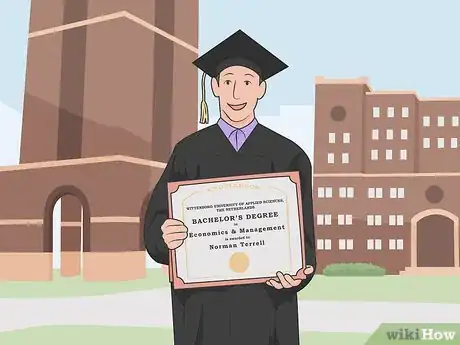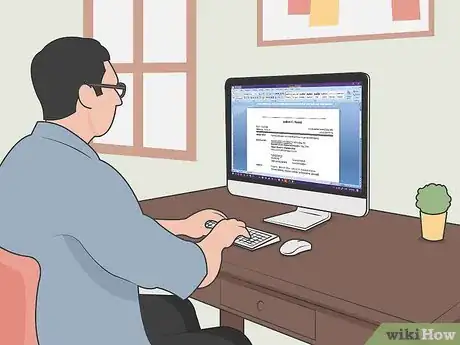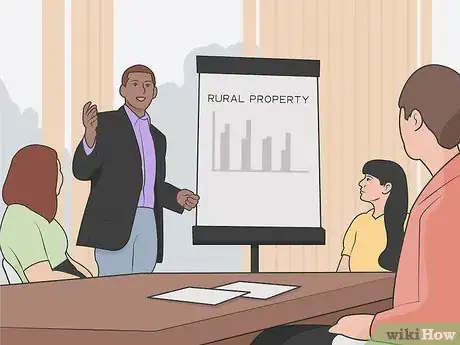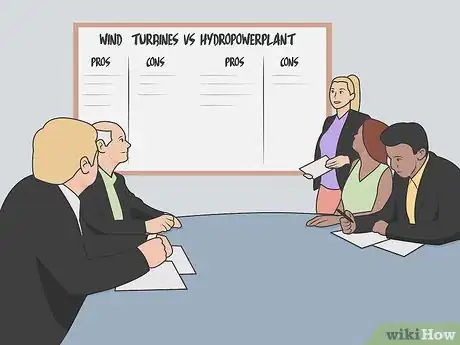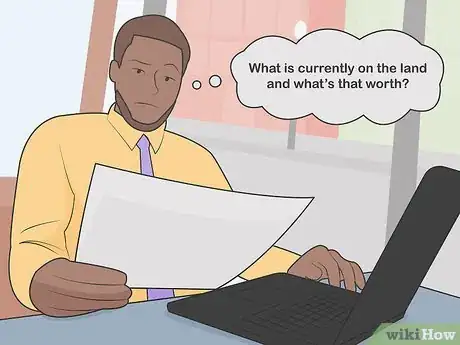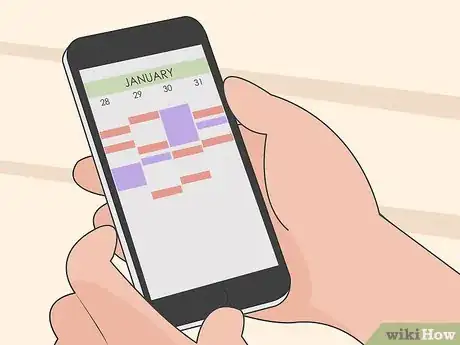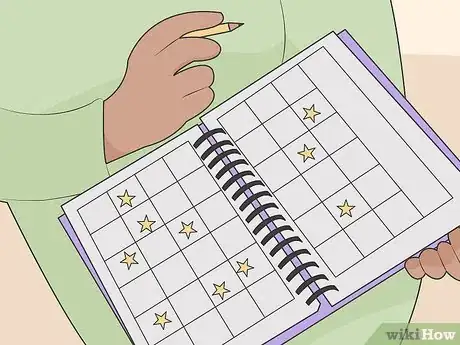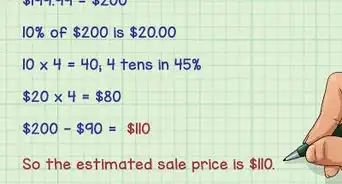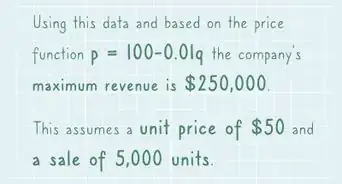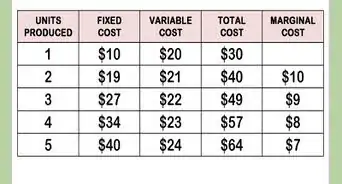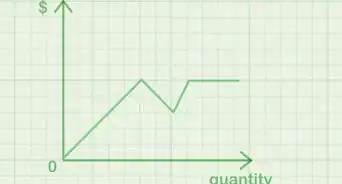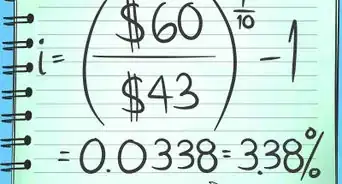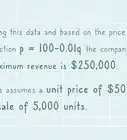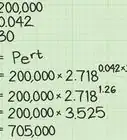This article was co-authored by wikiHow Staff. Our trained team of editors and researchers validate articles for accuracy and comprehensiveness. wikiHow's Content Management Team carefully monitors the work from our editorial staff to ensure that each article is backed by trusted research and meets our high quality standards.
There are 17 references cited in this article, which can be found at the bottom of the page.
This article has been viewed 5,062 times.
Learn more...
Land economists wear many hats! From assessing the value of plots of land to advising others on how to use a piece of land or its resources, being a land economist requires great attention to detail, critical thinking skills, data crunching, and a keen understanding of market trends. Getting an education in economics or any related field is the first step you need to take before you jumpstart your career and be the best land economist you can be.
Steps
Becoming Qualified
-
1Get a Bachelor’s degree in economics or finance. Land economists need to have a range of knowledge in the areas of economic theory, macroeconomics, business, economic growth and development, and international economics. Anything that will give you a better understanding of how the economy works, how land is used, or how companies allocate funds for development is a great major to choose.[1]
- It will typically take 4 years of full-time study to complete undergraduate studies in economics.
-
2Study a related field like statistics, business, or business law. Very few schools offer degrees in land economics, so choosing something closely related is a good option. If you like to crunch numbers and envision a career in data analysis, statistics is a great choice. Business and business law are good options if you hope to work for a government agency or development company.[2]
- Business law might seem unrelated, but law informs the economy and vice versa.
Advertisement -
3Get a Bachelor of Science (BS) degree to focus on statistical analysis. Instead of a Bachelor of Arts degree (BA), consider getting your BS degree so you’re well-equipped to crunch numbers and make predictions about the value of properties. A BS degree program is more vigorous and may make you more attractive to employers down the line.[3]
- Another benefit of getting a BS is that your studies will give you a solid foundation for graduate school, should you choose to pursue a higher degree.
-
4Enroll in a dual-level program to study economics and environmental studies. If you want your work to focus on natural resources and environmental issues, you might get a second degree in forestry, geology, or environmental science at the same time as your economics degree. Most schools offer BA and BS degrees in these fields, but only some schools will offer a dual-level program so you can study these fields along with another major (in this case, economics or something related).[4]
- For instance, you might get a BS degree in economics to enhance your statistical analysis skills and a BA in environmental science to have a better understanding of the earth and how natural resources are used in society.
-
5Go to graduate school for public policy to work for a government agency. Departments responsible for allocating natural resources, city planning, housing and development, and transportation need land economists in order to move ahead with their respective initiatives. In a Master’s program, you’ll be looking at case studies of various policies and how they impacted the economy, law, and overall functioning of counties and cities.[5]
- Public policy is what government agencies do in response to fix some kind of problem and make it better for the public.
-
6Get a Master’s in business analytics to work in the private sector. Private development companies, landowners, and entrepreneurs often hire land economists to manage their portfolios and help inform decisions for buying or selling land. A Master’s program will teach you the lingo you need to know to communicate in these circles and give a better understanding of how to turn lots of data into actionable predictions.[6]
- As an alternative, consider getting a Master’s of Business Economics or Master’s of Business and Management (MBM).
- If you want to gain some experience before getting your Master’s, an MBA is typically geared toward people who have 2 to 3 years of professional experience after undergraduate school.
-
7Enroll in a Master of Science (MS) program if you want to work as an analyst. An MS program focuses more on scientific and technical aspects like statistics and data analysis, while an MA focuses more on humanities and research. An MS program tends to be more rigorous and therefore many employers prefer to hire people with this type of degree.[7]
- If you have a BA, most graduate schools will only allow you to get an MA (not an MS). If you have a BS, most schools will allow you to do either an MA or MS. Check the policy for your preferred graduate school.
-
8Take on an internship to gain experience and connections. An internship or part-time job is a great way to start your career as a land economist while you’re still in school or just after you graduate. Government agencies, financial institutions, and economic consulting firms are great places to apply and gain experience.[8]
- Your school may be able to connect you with internship opportunities.
- If possible, go to job fairs held at your school to find part-time internships or apprenticeships while you’re in school or full-time internships after you graduate.
- Ideally, apply to companies where you suspect you may want to work later on. For example, if you want to work for a consulting firm, seek out local firms and ask if they’re looking for interns.
Starting Your Career
-
1Tailor your resume to the job you’re applying for. Read job descriptions carefully and tune your resume for each job submission. Include skills and experience that show you’re the perfect person for the job.[9]
- For example, if the job description states “must have experience maintaining investment portfolios,” be sure to write a former job or internship that you had where one of your duties was maintaining portfolios.
- Use a simple, easy-to-read format and only include the skills and experiences that are related to that particular job.
-
2Search for jobs as a “valuer” or “asset manager” to work for private companies. Go to any job search platform and type “land economist,” “valuer,” “real estate asset manager,” or “resource planning analyst” to find employment opportunities at private development or investment businesses. Filter the results for your city and state for local opportunities.[10]
- For instance, the American Economic Association is a good place to start looking for work.
-
3Look for “statistician,” or “urban planner” jobs to work for government agencies. Type “statistician,” “urban planner,” or “research economist” into the job search field on any employment platform to see available government positions. You can also go to your state’s workforce commission website and browse for jobs on the employment opportunities page.[11]
- For instance, if you want to work for the US Department of the Interior, find jobs at https://www.doi.gov/careers/.
- You can also go to https://www.usa.gov/government-jobs.
-
4Make contacts online via social and professional media platforms. Sites like LinkedIn are a great source to expand your contacts and find work. Connect with someone who you went to school with so you can browse and connect with their contacts—pay attention to job titles so you know the names and positions of people at a certain company you want to work for.[12]
- Everyone benefits from expanding their network, so don't be shy about connecting with people you don't know.
-
5Attend local networking events to make connections and find employers. To find networking events, go to your city's Chamber of Commerce site and browse upcoming events or simply do an internet search for networking events in your city (e.g., “Chicago networking events” or “Atlanta economist networking events”). Introduce yourself and engage in casual conversation just like you would with a new friend. Be clear about the fact that you're looking for work but don't be too pushy about it.[13]
- Take business cards with you so you can mingle and professionally market yourself to other economists, CEOs, accountants, and engineers.
-
6Apply to work for a government agency to make a difference in your community. Urban development government agencies need people who can assess the value of particular pieces of federal, public, or private land and advise them on how to best utilize certain spaces. Land economists are especially necessary when it comes to city planning because what type of buildings and utilities go where will have a lot to do with how the public uses them and how traffic flows within a certain area.[14]
- As an example, the Department of Housing and Urban Development might give you the task of assessing the value of a foreclosed property.
- Government agencies that need land economists include the Department of Housing and Urban Development, Department of Transportation, the Department of the Interior, the Federal Housing Administration, and the General Land Office.
- Working for a government agency will also give you certain benefits like health insurance, retirement and vacation days, and opportunities to develop, plan, and advance your career.
-
7Work as an advisor for investment and development companies. Companies that develop land for commercial use need someone to keep track of their portfolio of work and analyze whether their projects are economically fruitful. In this role, you'll be advising CEOs, accountants, engineers, and investors on how to develop and manage a particular property in a profitable way.[15]
- You’ll need to have excellent written and oral communication skills to break down complicated data into layman’s terms.
-
8Join an economic consulting firm to work with a variety of clients. Joining a consulting firm can be a lucrative way to work as a land economist in several different fields. You might be hired by a government agency, development companies, private firms, or individuals to perform a range of tasks from analysis and making predictions to managing portfolios and valuing land. This is a good option if you want to work for yourself and enjoy variety in the type of work you do from week to week.[16]
- For instance, one week you might be hired by an entrepreneur to assess the value of a piece of rural property and the next week you might give the Department of Housing and Urban Development a report on the fiscal costs or benefits of leaving a piece of federal land undeveloped.
- Once you get the hang of working at an economic consulting firm, you might even start your own!
-
9Be a consultant if you want to focus on market trends and data analysis. As an economic consultant, you’ll be analyzing data and giving investors or banks advice about the pros and cons when it comes to investing in a particular piece of land or development project. Appraising the land and its property values are going to be crucial, so you’ll need to have great analytical skills, keep up with economic trends, and be extremely detail-oriented.[17]
- Some banks and private investment companies have in-house economic advisors.
- Knowing about property rights will also come into play if you choose to work with private or public investors.
- For instance, you’ll need to be able to explain to an entrepreneur why or why not it’s a good idea for them to lease a portion of their land to a development firm that wants to put a strip mall on the property.
-
10Go into environmental economics, if applicable, to protect natural resources. Environmentalist nonprofits, public entities, and private investors often look to land economists to assess the value of areas containing natural resources. In this role, you might evaluate certain rural or urban areas to determine the costs, benefits, incentives, and impacts of using alternative energy sources on the land or avoiding development to protect natural resources.[18]
- For example, you might look at the pros and cons of installing wind turbines on a piece of undeveloped land (versus a hydropower plant or nothing at all) and help developers make an informed decision.
- This is a great option if you studied environmental law, forestry, renewable energy, or natural resources as a sub-discipline in undergraduate or graduate school.
- The Environmental Protection Agency and any other government agencies having to do with natural resources (like your local Department of Water and Power) may also require your services.
Honing Your Skills
-
1Enhance your verbal communication skills. Communication skills are crucial because you’ll need to be able to break down complex data into terms that CEOs, land surveyors, geologists, accountants, entrepreneurs, and engineers can understand. To sharpen your communication skills, keep your message clear, brief, and to the point. Try to engage your listener by using a friendly, informative tone, and practice active listening so you can better understand and respond to their questions or concerns.[19]
- For instance, instead of presenting a client with a stack of papers containing your statistical findings, make a graph or visual depiction of the findings and be able to walk them through it.
-
2Practice writing clearly and concisely. Being able to write is also a crucial part of the job because you’ll need to write with confidence and clarity in emails, memos, and reports for clients and colleagues. Use a grammar application to avoid embarrassing typos, run-on sentences, subject-verb agreement errors, and other mistakes.[20]
- Practice writing as you speak to develop a “voice” and then edit what you’ve written to adhere to proper English.
- After writing an email or report, read it aloud to check for errors and clarity.
-
3Increase your critical thinking skills to be a better analyst. When you're dealing with lots of data and potentially shifting variables, you need to know how to look at all those factors from different angles. To improve your critical thinking skills, ask questions, think through situations logically, and expose yourself to people who think differently than you do.[21]
- Thinking outside the box will help you come up with lucrative solutions to your client's queries.
- For example, when assessing the value of a particular piece of land, you might ask yourself: What is currently on the land and what’s that worth? What are the property taxes for the particular piece of land and how might that change in the next 5 years? What benefits will the public gain from developing on this land?
-
4Work on your time management skills. Any form of economics deals with factors that are, more or less, often changing (and quickly, at that!). And most economists work full-time with long hours and rigorous deadlines. Use a scheduling app on your phone or computer and set alarms to keep up with deadlines and daily work.[22]
- Be sure to schedule short breaks throughout the day so you don’t get burnt out. Exercise, meditation, and yoga are all restorative distractions that will keep your brain sharp.
-
5Prioritize the most important tasks first. Never procrastinate and address the most important stages of any project first before tackling smaller or less crucial components. To help you figure out the most important tasks, make a list of everything you need to do for the day or week. Then put a star next to the most urgent tasks (the ones that are overdue or need to be done for others to do their tasks) and complete those first.[23]
- For instance, make a statistical analysis of market trends before you update a client’s portfolio with prospective gains or losses.
-
6Check the news to keep up with national and international markets. As a land economist, one of your responsibilities is advising others to make financially sound decisions. That means you need to keep up with market trends and incorporate those factors into your analysis. Check the news on national and international websites and take note of any increases or dips to help you anticipate economic fluctuations and the impact that might have on your analyses (and clients!).[24]
- For instance, say a piece of land has a natural resource like crude oil. If the international price of oil goes up, that piece of land will become more valuable to the owner and, in turn, will affect how they manage it.
Warnings
- Being a land economist is rigorous and time-consuming, so understand that you may need to make sacrifices in other sectors of your life to achieve your goals.⧼thumbs_response⧽
References
- ↑ https://www.timeshighereducation.com/student/subjects/what-can-you-do-economics-degree
- ↑ https://law.stanford.edu/areas_of_interest/law-economics-business/
- ↑ https://www.edsmart.org/difference-between-ba-and-bs-degree/
- ↑ https://www.timeshighereducation.com/student/subjects/what-can-you-do-economics-degree
- ↑ https://www.civiced.org/pc-program/instructional-component/public-policy
- ↑ https://www.mastersindatascience.org/schools/top-masters-in-analytics/
- ↑ https://www.mastersindatascience.org/schools/top-masters-in-analytics/
- ↑ https://www.naceweb.org/job-market/internships/the-positive-implications-of-internships-on-early-career-outcomes/
- ↑ https://www.businessinsider.com/12-ways-to-make-your-resume-stand-out-2014-4
- ↑ https://www.aeaweb.org/joe/listings
- ↑ https://www.aeaweb.org/joe/listings
- ↑ https://www.forbes.com/sites/billconerly/2016/05/16/networking-for-economics-majors-getting-contacts-for-job-search/#72b8af28c889
- ↑ https://www.forbes.com/sites/billconerly/2016/05/16/networking-for-economics-majors-getting-contacts-for-job-search/#72b8af28c889
- ↑ https://gogovernment.org/pros-and-cons-of-working-in-government/
- ↑ https://joboutlook.gov.au/Occupation?search=alpha&code=2245
- ↑ https://www.aeaweb.org/resources/students/careers/econ-consulting
- ↑ https://www.aeaweb.org/resources/students/careers/econ-consulting
- ↑ https://www.mynextmove.org/profile/summary/19-3011.01
- ↑ https://www.businessinsider.com/5-simple-habits-that-will-make-you-a-better-communicator-2016-2
- ↑ https://www.forbes.com/sites/nextavenue/2016/03/09/how-to-improve-your-writing-skills-at-work/#36cc73b6899b
- ↑ https://hbr.org/2019/05/3-simple-habits-to-improve-your-critical-thinking
- ↑ https://www.truity.com/career-profile/economist
- ↑ https://www.truity.com/career-profile/economist
- ↑ https://www.truity.com/career-profile/economist
